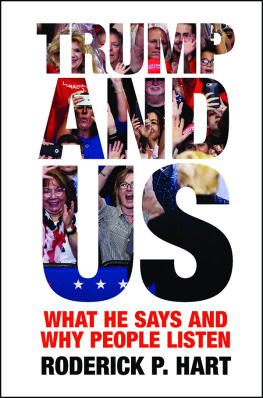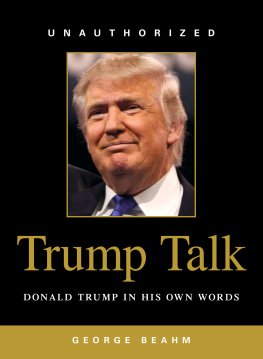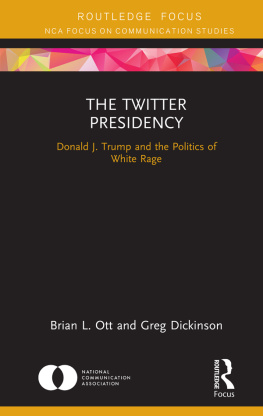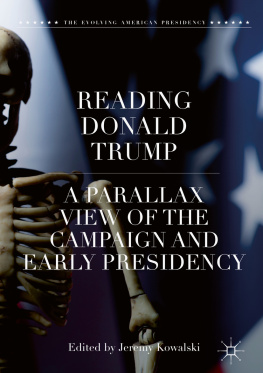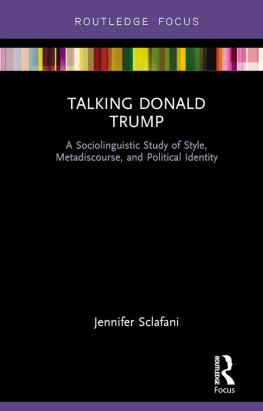Why did 62 million Americans vote for Donald Trump? Trump and Us offers a fresh perspective on this question, taking seriously the depth and breadth of Trumps support. An expert in political language, Roderick P. Hart turns to Trumps words, voters remarks, and media commentary for insight. The book offers the first systematic rhetorical analysis of Trumps 2016 campaign and early presidency, using text analysis and archives of earlier presidential campaigns to uncover deep emotional undercurrents in the country and provide historical comparison. Trump and Us pays close attention to the emotional dimensions of politics, above and beyond cognition and ideology. Hart argues it was not partisanship, policy, or economic factors that landed Trump in the Oval Office but rather how Trump made people feel.
Roderick P. Hart holds the Shivers Chair in Communication and is Professor of Government at the University of Texas at Austin. Former dean of the Moody College of Communication and founding director of the Annette Strauss Institute for Civic Life, Hart is the author or editor of fifteen books, most recently Civic Hope: How Ordinary Americans Keep Democracy Alive (2018). Hart has been named a Fellow of the International Communication Association and a Distinguished Scholar by the National Communication Association. He has received the Edelman Career Award from the American Political Science Association.
Editors
W. Lance Bennett, University of Washington
Robert M. Entman, The George Washington University
Politics and relations among individuals in societies across the world are being transformed by new technologies for targeting individuals and sophisticated methods for shaping personalized messages. The new technologies challenge boundaries of many kinds between news, information, entertainment, and advertising; between media, with the arrival of the World Wide Web; and even between nations. Communication, Society and Politics probes the political and social impacts of these new communication systems in national, comparative, and global perspective.
Other Books in the Series:
Erik Albk , Arjen van Dalen , Nael Jebril , and Claes de Vreese , Political Journalism in Comparative Perspective
Eva Anduiza , Michael James Jensen , and Laia Jorba , eds., Digital Media and Political Engagement Worldwide: A Comparative Study
C. Edwin Baker , Media Concentration and Democracy: Why Ownership Matters
C. Edwin Baker , Media, Markets, and Democracy
W. Lance Bennett and Robert M. Entman , eds., Mediated Politics: Communication in the Future of Democracy
Rodney Benson , Shaping Immigration News: A French-American Comparison
Bruce Bimber , Information and American Democracy: Technology in the Evolution of Political Power
Bruce Bimber , Andrew Flanagin , and Cynthia Stohl , Collective Action in Organizations: Interaction and Engagement in an Era of Technological Change
Clifford G. Christians Media Ethics and Global Justice in the Digital Age
Lynn S. Clark and Regina Marchi , Young People and the Future of News
Peter Dahlgren , Media and Political Engagement, Citizens, Communication and Democracy
Murray Edelman , The Politics of Misinformation
Frank Esser and Barbara Pfetsch , eds., Comparing Political Communication: Theories, Cases, and Challenges
Myra Marx Ferree , William Anthony Gamson , Jrgen Gerhards , and Dieter Rucht , Shaping Abortion Discourse: Democracy and the Public Sphere in Germany and the United States
Hernan Galperin , New Television, Old Politics: The Transition to Digital TV in the United States and Britain
Tim Groeling , When Politicians Attack: Party Cohesion in the Media
Trump and Us
What He Says and Why People Listen
Roderick P. Hart
University of Texas at Austin
University Printing House, Cambridge CB 2 8 BS , United Kingdom
One Liberty Plaza, 20th Floor, New York, NY 10006, USA
477 Williamstown Road, Port Melbourne, VIC 3207, Australia
314321, 3rd Floor, Plot 3, Splendor Forum, Jasola District Centre, New Delhi 110025, India
79 Anson Road, #0604/06, Singapore 079906
Cambridge University Press is part of the University of Cambridge.
It furthers the Universitys mission by disseminating knowledge in the pursuit of education, learning, and research at the highest international levels of excellence.
www.cambridge.org
Information on this title: www.cambridge.org/9781108490818
DOI: 10.1017/9781108854979
Cambridge University Press 2020
This publication is in copyright. Subject to statutory exception and to the provisions of relevant collective licensing agreements, no reproduction of any part may take place without the written permission of Cambridge University Press.
First published 2020
Printed in the United States of America by Sheridan Books, Inc.
A catalogue record for this publication is available from the British Library.
Library of Congress Cataloging-in-Publication Data
Names : Hart, Roderick P., author.
Title : Trump and us : what he says and why people listen / Roderick P. Hart, University of Texas, Austin.
Other titles : What he says and why people listen
Description : Cambridge, United Kingdom ; New York, NY : Cambridge University Press, 2020. | Includes index.
Identifiers : LCCN 2019038249 (print) | LCCN 2019038250 (ebook) | ISBN 9781108490818 (hardback) | ISBN 9781108796415 (paperback) | ISBN 9781108854979 (epub)
Subjects: LCSH : Trump, Donald, 1946Language. | Trump, Donald, 1946Influence. | Political cultureUnited States. | Communication in politicsUnited StatesHistory21st century. | Press and politicsUnited States.
Classification: LCC E 912 . H 37 2020 (print) | LCC E 912 (ebook) | DDC 973.933092dc23
LC record available at https://lccn.loc.gov/2019038249
LC ebook record available at https://lccn.loc.gov/2019038250
ISBN 978-1-108-49081-8 Hardback
ISBN 978-1-108-79641-5 Paperback
Cambridge University Press has no responsibility for the persistence or accuracy of URLs for external or third-party internet websites referred to in this publication and does not guarantee that any content on such websites is, or will remain, accurate or appropriate.
To the Dealey, Denius, Moody, and Strauss families of Texas
For their wisdom, generosity, and friendship
Contents
Figures
Tables
Acknowledgments
On the morning of November 9, 2016, I found myself in a crowded hotel lobby in Philadelphia as the annual meeting of the National Communication Association (NCA) got underway. The convention attracts some 5,000 attendees each year, most of whom hold faculty appointments at the nations colleges and universities. On that Wednesday morning, however, it attracted only lacrimation. Sans credentials, I found myself playing the role of grief counselor, as friend after friend complained about the election. Like most academics, NCA attendees largely vote Democratic and, because the field of communication attracts so many women, the outcome of the 2016 campaign hit them particularly hard. Searching for a sliver of optimism, I told the bereaved that the next four years would be a boon to scholarship, helping us unravel mysteries about language, politics, and media in the United States. From what I could tell, my brave pronouncements buoyed up not a single spirit in the City of Brotherly Love on that crisp fall morning.

